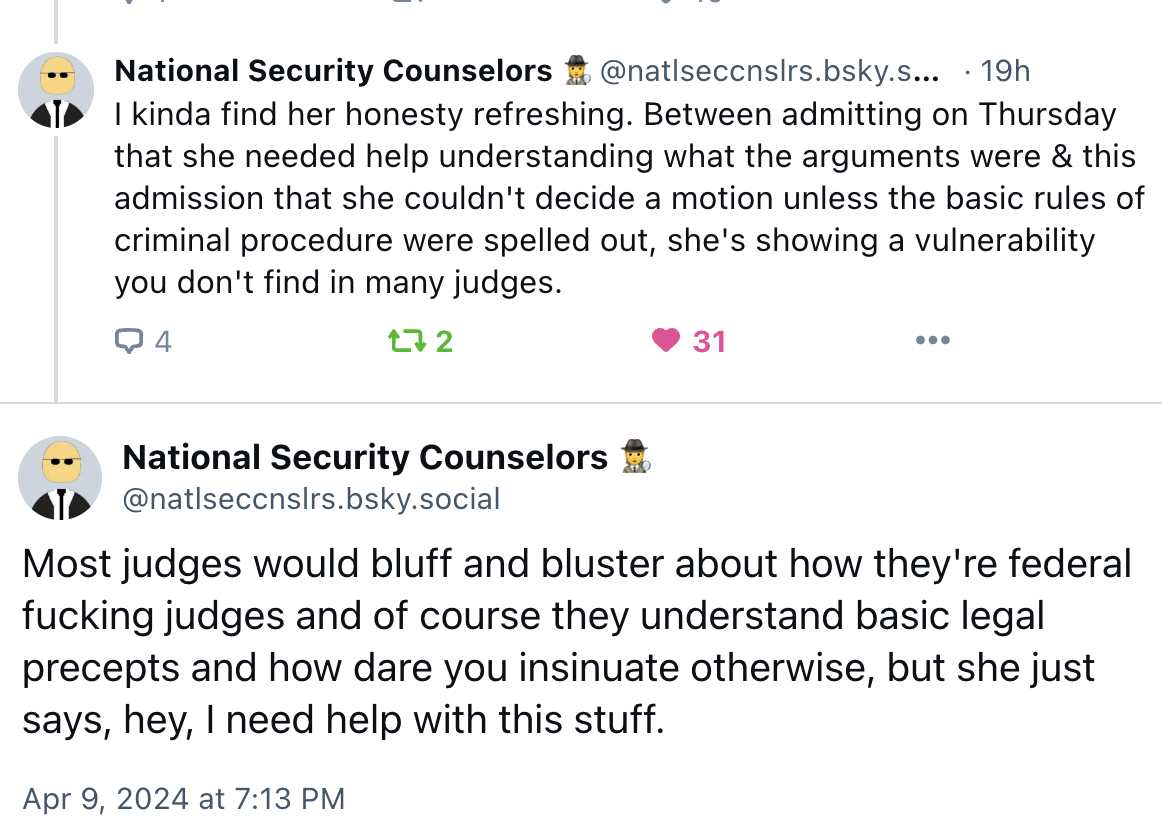[ad_1]

Aileen Cannon
Judge Aileen Cannon is wilding out again. This time she’s filed a ridiculously snotty ruling that grants Special Counsel Jack Smith’s request while simultaneously excoriating him for failing to educate her on the difference between trial exhibits and protected discovery materials.
How was she supposed to know that grand jury transcripts don’t go on the public docket? She’s just a lowly federal judge with life tenure!
The kerfuffle began back in January when Trump filed a gonzo motion to compel in his stolen documents case. He demanded discovery from the entire executive branch — more or less — on the theory that everyone from the White House Counsel to the head of the NSA were part of the prosecution’s “discovery team.” As with so many filings in this case, that motion remains pending. But Trump’s team tried to stick it to the prosecutors by requesting to put an unredacted version of the motion, along with the exhibits, on the public docket. And that is what kicked off this whole fight.
The government’s four-page response pointed out that Trump was seeking to disclose witness names, personally identifying information, grand jury testimony, and early disclosures of Jencks Act material, all of which were covered by a protective order. The special counsel did not state the legal standard for redacting protected discovery in a motion to compel — perhaps because he was (overly) confident that a federal judge would be familiar with the standard in her own Circuit, or perhaps because prosecutors are simply accustomed to unquestioning deference from the bench.
After a further round of briefing, in which Trump and the media intervenors claimed that the First Amendment requires disclosure of discovery materials, Judge Cannon applied the First Amendment standard for sealing trial evidence, not the lower standard for protected discovery. At which point the special counsel awoke from his nap and shouted “OH SHIT! SHE’S REALLY GONNA DO IT!” (Probably, we are guessing.)
In a motion for reconsideration, prosecutors finally deigned to explain, as if to a law clerk on her first day in chambers, that discovery materials are not the same as trial exhibits.
Both the First Amendment and the common law grant the press and the public a qualified right of access to criminal trial proceedings and certain judicial records. See Richmond Newspapers, Inc. v. Virginia, 448 U.S. 555 (1980). But neither the First Amendment nor the common law grants the press or the public a right to access discovery materials. Chicago Tribune Co., 263 F.3d at 1310-13; See Nickens, 809 F. App’x at 591.
So, no, Your Honor, the First Amendment does not mean that you must allow the Defendant to put grand jury transcripts and witness names on the public docket.
That was two whole months ago, and while Judge Cannon was thinking about it, one of the witnesses outed himself on CNN, rather than wait for the judge to do it for him. Which is a hell of a testament to her trial management skills!
But last night, the court finally managed to get its homework turned in.
TL, DR: She did the right thing, mostly. But first she abused the special counsel for not explaining LAW to her.
“The Special Counsel’s response did not object to the Press Coalition’s invocation of First Amendment principles, did not meaningfully engage with any of the legal standards, and did not offer any additional factual support,” she snarked, adding that “the arguments and evidence advanced in the Special Counsel’s Motion could have, and should have, been raised in prior filings. Denial of the Motion would be appropriate on that basis.”
That last comes just a page after she acknowledged that the materials Trump seeks to disclose include grand jury testimony of an FBI Special Agent and a Secret Service Agent, internal emails between members of the Secret Service, and internal Secret Service documents discussing security protocols at Mar-a-Lago — all of which the government pointed out in its original motion fall under the category of protected discovery which does not become magically unprotected just because the Defendant attaches it to one of his eleventy-seven garbage motions.
The judge repeatedly blamed the special counsel for simply noting that the disputed documents contained grand jury material and not going on to explain why it should be protected, but eventually conceded that “the most faithful application of Supreme Court and available Eleventh Circuit authority is that Defendants’ MTC in this case is not subject to a public right of access, whether constitutional or common law in nature, because it is a still, ultimately, a discovery motion as distinct from a substantive pre-trial motion requiring judicial resolution on the merits.”
Ya think?
After yelling some more at the prosecutors, Judge Cannon agreed to redact witness identities, personal identifying information, and grand jury transcripts. She is letting in some of the other witness statements and emails, with redactions — although that is sure to set off a media frenzy to identify the parties, potentially turning those witnesses into targets for Trump’s howler monkey brigade. But once again she’s stepped back from the precipice and failed to give the special counsel something concrete to take to the Eleventh Circuit.
On Bluesky, national security lawyer Kel McClanahan joked that it was “refreshing” to see a federal judge show “vulnerability” and admit that she needs help with basic legal principles.

“Most judges would bluff and bluster about how they’re federal fucking judges and of course they understand basic legal precepts and how dare you insinuate otherwise,” he laughed, “but she just says, hey, I need help with this stuff.”
But, she’s probably not getting slapped down by the Circuit this time, so … well played, Judge Cannon. You win again.
US v. Trump [SDFL Docket via Court Listener]
Liz Dye lives in Baltimore where she produces the Law and Chaos substack and podcast.
[ad_2]




